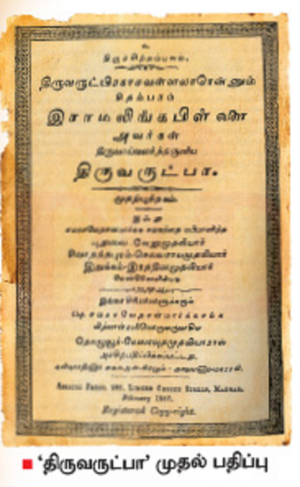Arutpa Marutpa Debate
🔏Being Created-en
Please do not write any content below this line. This section is only for editing templates & categories.
இந்தப் பக்கத்தை தமிழில் வாசிக்க: அருட்பா மருட்பா விவாதம்
Arutpa Marutpa debate (1867 - 1904) is a debate initiated by Arumuga Navalar of Jaffna against the compilation of the songs of Ramalinga Vallalar under the name Arutpa. He argued that only the Saiva Thurumuraigal can be called Arutpa and Ramalinga Vallalar's songs would have to be categorized as Marutpa. Various scholars joined the debate by taking either sides and each side published criticisms on the opposite side. Even defamation suits were filed by both sides.
Basis of the debate
When the songs of Ramalinga Vallalar were compiled and published as a text by his principle student Ubayakalanidhi Thozhuvur Velayutha Mudhaliar, he named the text as Thiru Arutpa. Ramalinga Vallalar did not dispute this. Thozhuvur Velayutha Mudaliar has mentioned this in his poem titled Thiruvarutpa Varalaaru. The word Thiru indicates wealth, respect, auspicious nature.
Thozhuvur Velayutha Mudaliar split the songs of Ramalinga Vallalar into 6 Thirumurai. The word Murai indicates arrangement, order, structure, assemblage. The categories were named as Thirumurai since the complete text was called Thiruvarutpa.
The publication work of Thiruvarutpa started in 1860 and ended in 1867. The letters written by Ramalinga Vallalar show that the first 4 Thirumurai were published with his consent and oversight. Thozhuvur Velayitha Mudaliar mentions that Ramalinga Vallalar was furious on seeing the author's name was mentioned as Thiruvarutprakaasa Vallalar, as he had asked the author's name to be published as Chidambaram Ramalingam Pillai only. Later Ramalinga Vallalar pacified himself by splitting the author name as Thiruvarutprakasa + Vallal + R and justifying that only the last part of "R" referred to him and the "Vallal" referred to the God addressed in the poems.
Objection
In 1864, Shri Arumuga Navalar from Nallur, Jaffna district had established a school , Saivaprakasa Vidyasaalai, at Chidambaram. He published books from the school and was also giving oratory talks on Saivism from there. During that time, Ramalinga Vallalar's Arutpa was also being recited in various temples in addition to Saiva Thirumuraigal. The key reasons for this were that, Arutpa was easy to understand, was widely published and the traditional Saiva Thirumuraigal were unavailable to the general public other than Othuvars (people who chant devotional hymns in Saivaite temples). There was an unwritten restriction on the chanting of Saiva Thirumuraigal by people who were not Othuvars or upper caste Saivaites.
Shri Arumuga Navalar was furious on seeing Vallalar's songs being chanted in temples on par with Saiva Thirumuraigal. He felt that it is because these songs were published with the name of Arutpa and Thirumuraigal. He was also of the opinion that Thondaimandalam Mudaliar caste people were considering that these songs belonged to their caste. There was some truth in this assumption also.
Arumuga Navalar insisted on all Saivite temples to follow the Agama based worship practices. He considered all other forms of worship as incorrect. He tried to strongly establish the traditional customs. Hence he thought that the practice of chanting Vallalar's songs in temples is a big violation and an act that disgrace upon the Saivam religion. He strongly kept condemning this practice in all the places where he was making religious discourses. He called Ramalinga Vallalar's songs as Marutpa and not Arutpa.

